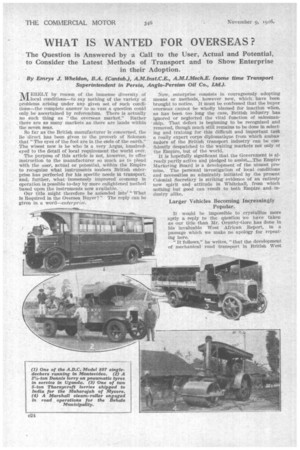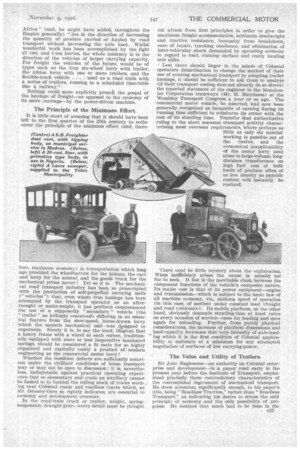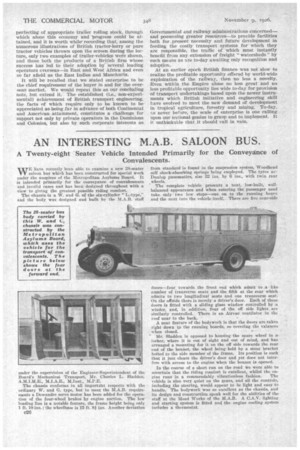WHAT IS WANTED FOR OVERSEAS?
Page 82

Page 83

Page 84

If you've noticed an error in this article please click here to report it so we can fix it.
The Question is Answered by a Call to the User, Actual and Potential, to Consider the Latest Methods of Transport and to Show Enterprise in their Adoption.
By Emrys J. Wheldon, B.A. (Cantab.), A.M.Inst.C.E., A.M.LMech.E. (some time Transport Superintendent in Persia, Anglo-Persian Oil Co., Ltd.).
MERELY by reason of the immense diversity of local conditions—to say nothing of the variety of problems arising under any given set of such conditions—the complete answer to so vast a question could only .be ascertained by referendum. There is actually no such thing as "the overseas market." Rather there are as many markets as there are lands within the seven seas.
So far as the British manufacturer is concerned, the lie direct has been given to the proverb of Solomon that "The eyes of the fool are in the ends of the earth." The wisest now is he who is a very Argus, hundredeyed to the detail of local requirement the world over.
The purpose of this article is not, however, to offer instruction to the manufacturer so much as to plead with the user, actual or potential, within the Empire to recognize what instruments modern British enterprise has perfected for his specific needs in transport, and, further, what immensely 'improved economy in operation is possible to-day by more enlightened method based upon the instruments now available.
Our title might therefore be amended into' "What Is Required in the Oversea Buyer?" The reply can be given in a word—enterprise.
Now, enterprise consists in courageously adopting means or methods, however new, which have been brought to notice. It must be confessed that the buyer overseas cannot be wholly blamed for inaction when, as has been too long the case, British industry has ignored or neglected the vital function of salesmanship. That defect is beginning to be recognized and removed, though much still remains to be done in selecting and training for this difficult and important task a really expert corps diplomatique from which ambac sadors of the British transport industry can be confidently despatched to the waiting markets not only of the Empire, but of the world.
It is hopefully significant that the Government is already partly active and pledged to assist.__The Empire .Marketing Board is a development of the utmost promise. The personal investigation of local conditions and necessities so admirably initiated by the present Colonial Secretary is striking evidence of an entirely new spirit and attitude in Whitehall, from which .nothing but good can .result to both Empire and industry alike.
Larger Vehicles Becoming Increasingly Popular.
It would be impossible to crystallize more aptly a replyto the question we' have taken as our title. than. Mr. Ormsby-Gore has done in his invaluable West" African Report, in a passage which we make no apology for repeating here.
"It follows," he writes, "that the development of mechanical road 'transport in British West 'Africa ". (and, he might have added, throughout the Empire generally) "lies in the direction of increasing the quantity of produce carried or hauled by road transport without increasing the axle load. Whilst wonderful work has been accomplished by the light 27 cwt. and 1-ton lorries, the whole tendency is in the direction of the vehicles of larger carrying capacity. For freight the vehicles of the future would be of types such as the Guy six-wheel lorry with trailer, the Albion lorry with one or more trailers, and the flexible-track vehicle . . . . used as a road train with a series of trailers, running to a scheduled time-table like a railway."
Nothing could more explicitly preaA the gospel of the haulage of freight—as opposed to the economy of Its ,mere carriage—by the power-driven machine.
The Principle of the Minimum Effort.
it is little short of amazing that it should have been left to the first quarter of the 20th century to rediscover the principle of the minimum effort (and, there
fore, maximum economy) in transportation which long ago provided the wheelbarrow for the human, the cart and lorry for the animal, and the goods truck for the mechanical prime mover i Yet so it is. The mechanical road transport industry has been so preoccupied with the production of self-propelled carrying units (" vehicles ") that, even where true haulage has been attempted by the transport operator as an afterthought or make-weight, it has perforce countenanced the use of a supposedly " secondary " vehicle (the " trailer " as hitherto conceived) differing in no essential feature from the slow-speed, horse-drawn lorry which the modern mechanical unit was dvigned to supersede. Surely it is, to say the least, illogical that a heavy frame with a wheel at each corner, traditionally equipped with more or less inoperative laminated springs, should be considered a fit mate for so highly organized and capitally costly a product of modern engineering as the commercial motor lorry!
Whether the resultant defects are sufficiently notorious under the civilized conditions of home transport may or may not be open to discussion ; it is, nevertheless, indisputable against practical operating experience that so elementary and crude an auxiliary cannot be looked to to furnish the rolling stock of trains work-, !lig over Colonial roads and roadless tracts which, as Mr. Ormsby-Gore so rightly indicates, are essential to economy and development overseas.
In the road-train truck or trailer, weight, springsuspension, draught gear—every detail must be thought out afresh from first principles in order to give the maximum freight accommodation, minimum deadweight and tractive resistance, immunity from breakdown, ease of renair, tracking obedience, and elimination of inter-vehicular shock demanded by operating economy in regard to load, running surface and costly hauling unit alike.
• Lest there should linger in the minds of Colonial operators disinclination to change the method of their use of existing mechanical transport by adopting trailer haulage, it should be sufficient to ask them to analyze (if-their transport costing does not already do so direct) the reported statement of the engineer to the Manchester Corporation tramways (Mr. H. Mattinson) at the Wembley Transport Congress a year or so ago. The -commercial motor vehicle, he asserted, had now been generally recognized as incapable of earning during its running time sufficient to reimburse its owner with the cost of its standing time. Transfer that authoritative ruling to the short seasonal transport activity characterising most overseas requirements, where perhaps as
little as only six months' working is possible out of the twelve, and the economical inapplicability of the motor lorry used alone to large-volume, long distance transference on high fuel cost of bulk loads of produce often of -as low density as payable content will instantly be realized.
'there need be little mystery about the explanation. When inefficiency arises the cause is usually not far, to seek. It lies in the inevitable clash between the component functions of the vehicle's composite nature. Its major cost is that of its power equipment—engine and transmission—which is subject to the basic law of all machine economy, viz., uniform speed of operation (in this case, of motion) under constant load (freight and road resistance). Its mobile platform, on the other hand, obviously demands standing-time at least twice on every occasion of service—onee for loading and once again for unloading. Further, from purely physical considerations, the increase of platform dimensions and load-capacity increases that very intensity of axle-loading which it is the first condition of Colonial applicability , to maintain at a minimum for any attempted negotiation of surfaces of low carrying-power.
The Value and Utility of Trailers.
Sir John Eaglesome—an authority on Colonial enterprise and development—in a paper read early in the present year before the Institute of Transport, emphasized precisely these contradictory characteristics of the conventional instrument of mechanical transport. He drew attention, significantly enough, to his paper's title, being ' Roadless Traction," rather than " Roadless TranSport," as indicating his desire to stress the only principle of economy and the only possibility of progress. He insisted that much had to be done in the perfecting of appropriate trailer rolling stock, through which alone this economy and progress could be attained, and it is worth while' recording that, among the numerous illustrations of British tractor-lorry or pure tractor vehicles thrown upon the screen during the lecture, only two examples of trailer-vehicles were shown, and those both the products of a British firm whose success has led to their adoption by several leading operators overseas—in East and West Africa and even so far afield as the East Indies and Manchuria.
It will be recalled that we stated enterprise to be the chief requirement of the buyer in and for the overseas market. We would repeat this as our concluding note, but extend it. The established (i.e., non-experimental) achievement of British transport engineering, the facts of which require only to be known to be appreciated as being far in advance of both Continental and American attainment, constitutes a challenge for support not only by private operators in the Dominions and Colonies, but also by such corporate interests as Governmental and railway administrations concerned— and possessing greater resources—to provide facilities both for present necessity and future development in feeding the costly transport systems for which they are responsible, the traffic of which must instantly benefit from any extension of freight " watersheds " by such means as are to-day awaiting only recognition and adoption.
At an earlier epoch British finance was not slow to realize the profitable opportunity offered by world-wide exploitation of the railway, then no less a novelty. Even within the Empire alone no less great and no less profitable opportunity lies wide to-day for provision of transport undertakings based upon the newer instruments which British initiative and engineering skill have evolved to meet the new demand of development in tropical• agriculture, forestry and mining. To-day, as never before, the scale of enterprise is one calling upon our national genius to grasp and to implement. It it unthinkable that it should call in vain.












































































































































































































